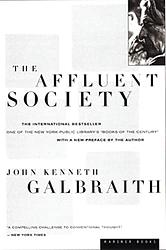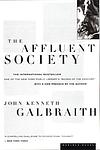The Affluent Society by John Kenneth Galbraith
"The Affluent Society" is a socio-economic critique that challenges the conventional wisdom of the time that economic growth leads to public wealth. The author argues that in reality, the increasing wealth of the United States has led to greater private affluence but public squalor due to inadequate investment in public goods and services. He proposes that society should strive for sustainable development rather than unlimited material advancement. The book has been influential in economic thought, particularly in the areas of public policy and consumer behavior.
The 408th greatest book of all time
Ranking Details:
Our ranking system awards points to books based on their appearance and position on curated lists. Here's how it works:
Unranked Lists: For lists without specific rankings, each book receives points equivalent to the list's weight. This approach recognizes the book's inclusion on prestigious lists.
Ranked Lists: Books on ranked lists receive points in two ways:
- Base Points: Initially, every book is awarded points equal to the list's weight, acknowledging its significance.
- Bonus Points: Additionally, books earn bonus points based on their ranking. The total bonus pool, equal to 100% of the list's weight, is distributed among the books, with higher-ranked books receiving more points.
Exponential Distribution: The distribution of bonus points follows an exponential model. This means the top-ranked book (#1) receives significantly more bonus points than those further down the list (e.g., #100). Our algorithm ensures that higher placements are rewarded more generously, reflecting the achievement of a top rank on any given list.
This scoring system ensures that each book's ranking reflects both its presence on multiple lists and its positions within those lists, providing a comprehensive measure of its acclaim and popularity.
Total Points: 815
Since this book was first published in 1958, there is a penalty of 0%. The age adjusted score is 815.0.
This is to prevent newer books from reaching super high on the ranked list of the greatest books of all time. The greatest books should also stand the test of time.
- score: 120 -- 50 Memorable Books from 50 Years of Books to Remember (Weight: 120)
- score: 114 -- The Hundred Most Influential Books Since The War (WW2) (Weight: 114)
- score: 110 -- The Modern Library | 100 Best Nonfiction (Weight: 108)
- score: 108 -- The New York Public Library's Books of the Century (Weight: 108)
- score: 102 -- 48 Good Books (Weight: 102)
- score: 90 -- Our Users' Favorite Books of All Time (Weight: 90)
- score: 90 -- Best Books Ever (Weight: 90)
- score: 81 -- The 100 Best Nonfiction Books of All Time (Weight: 81)

